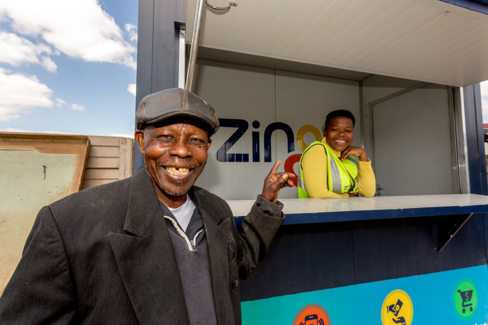
The Swiss Capacity Building Facility (SCBF) is a public-private development partnership dedicated to improving the lives and livelihoods of low-income people and micro-entrepreneurs in developing and emerging economies. It is a grant-making organisation with the objective to promote financial inclusion as a strategy for alleviating poverty.
SCBF currently unites 19 Switzerland-based member organisations, including SDC as the public partner and core funder. The members greatly contribute through their expertise, ensuring SCBF stays focused and selects high-impact projects for capacity building support. This creates a unique partnership working to help partner financial institutions to enhance their outreach to financially excluded populations, as part of social and economic development work.
Completed projects:
2016-02 Zingsure Zimbabwe (see picture to the right)

Zingsure Limited set up an insurance company, InsureCo, in Zimbabwe in a partnership with the Apostolic Council of Churches of Zimbabwe to increase insurance penetration and stimulate wealth creation. The insurance business is very likely to become the largest insurer in Zimbabwe within five years! Zing has created more than 300 jobs at grass roots and corporate level, and is likely to create 15,000 jobs by end of 2018. Zingsure is using the same successful business model to expand its operations in Malawi and Zambia.
2014-03 & FEW-04 KiWi MoroccoKiWi aimed to launch its eKiosk (an adapted ePayment solution allowing micro-merchants to receive and make payments) in Morocco. However, due to delays with obtaining an acquiring license by its initial partner ABB, and afterwards long negotiation processes with CMI, the only registered acquirer in Morocco, KiWi as a start-up was not able to endure such a delay and the project was terminated prematurely.
Approved projects:
2017-02 KiWi MexicoThe project aims to scale up KiWi´s cash disposal product as a next step in making KiWi a fully-fledged cash-flow management facility in Mexico. The main activities will be centred around developing and marketing a loan product that will be both sustainable for KiWi and meaningful for the micro-merchants.
2017-03 Grameen Crédit Agricole RMCR Mali The Réseau de Micro Institutions de Croissance des Revenus (RMCR) in Mali is seeking to improve agricultural risk management for both farmers and itself by bundling seasonal credit with crop insurance based on weather index. This will also provide adequate sources of financing to RMCR as the insurance premium will be financed with an investor. RMCR aim to reach 5,000 farmers with the product by project end after 12 months.
2017-04 Biashara na Fedha KenyaBiashara na Fedha aims to strengthen its role in the field of solar lending in Kenya by developing a new product niche of solar loans for MSMEs and extending the base of solar partners. By providing financing to several mid-sized solar players Biashara helps level the playing field and avoid over-concentration by the largest solar providers.
2017-05 Habitat FUDEMI & FUNDENUSE NicaraguaHabitat for Humanity International plans to develop a virtual tool to make the home improvement process more informed, integrated and effective for the families, and thus scale up outreach of housing microfinance products of 2 partner financial institutions FUNDEMI and FUNDENUSE in Nicaragua. Upon project completion, both institutions should be in a position to improve their access to financial products for local communities, while addressing gaps that hamper access to quality housing.
FEW-12 Lead Foundation EgyptThe main objective of this intervention is to design, implement and monitor a financial education campaign to enhance up-scaling and usage of Hemaya, a credit life and in-patient hospital cash health insurance product, which Lead has rolled out in all of its 18 branches since September 2016. 10 video cartoons and 10 eLearning modules will be developed together with a follow-up and data reporting system. The campaign aims to reach more than 10,000 clients and train at least 50 staff members and loan officers.
There are several other projects in the pipeline in Malawi,
Tunisia, Bangladesh, Kenya, Colombia, Nicaragua, Haiti, Zambia, Kenya, Madagascar, Tanzania, and more.
